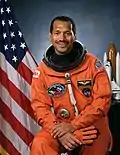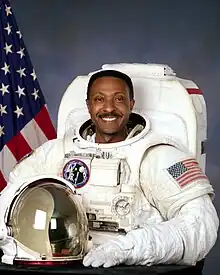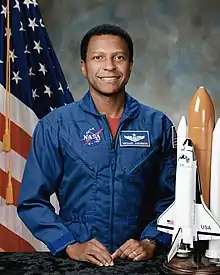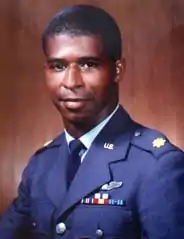.jpg.webp)
African-American astronauts are Americans of African descent who have either traveled into space or been part of an astronaut program.
African-American astronauts
Traveled into space
| # | Images | Names & Birth dates |
Notes | Missions & launch dates | Sources |
|---|---|---|---|---|---|
| 1 |  |
Guion Bluford November 22, 1942 |
First African-American astronaut in space | [1] | |
| 2 |  |
Ronald McNair October 21, 1950 †January 28, 1986 |
First Baháʼí in space; died in the Space Shuttle Challenger disaster | [1] | |
| 3 |  |
Frederick D. Gregory January 7, 1941 |
First African American to pilot and command a Space Shuttle mission; acting Administrator of NASA, 2005 | [1] | |
| 4 |  |
Charles Bolden August 19, 1946 |
Administrator of NASA, July 17, 2009 – January 20, 2017 | [1] | |
| 5 |  |
Mae Jemison October 17, 1956 |
First African-American woman in space |
|
[1] |
| 6 |  |
Bernard A. Harris Jr. June 26, 1956 |
First African American to walk in space | [1] | |
| 7 |  |
Winston E. Scott August 6, 1950 |
Veteran of three spacewalks | [1] | |
| 8 |  |
Robert Curbeam March 5, 1962 |
Veteran of seven spacewalks | [1] | |
| 9 |  |
Michael P. Anderson December 25, 1959 †February 1, 2003 |
Died in the Space Shuttle Columbia disaster | [1] | |
| 10 |  |
Stephanie Wilson September 27, 1966 |
[1] | ||
| 11 |  |
Joan Higginbotham August 3, 1964 |
|
[1] | |
| 12 |  |
Alvin Drew November 5, 1962 |
Veteran of two spacewalks, February 28 and March 2, 2011 | [1] | |
| 13 | .jpg.webp) |
Leland D. Melvin February 15, 1964 |
Associate Administrator for Education at NASA | [1] | |
| 14 |  |
Robert Satcher September 22, 1965 |
EVA November 19 and November 23, 2009 |
|
[1] |
| 15 |  |
Victor J. Glover April 30, 1976 |
Joined ISS Expedition 64 as first African-American on an ISS Expedition |
|
[2][3] |
| 16 |  |
Sian Proctor March 28, 1970 |
First African American female Spacecraft Pilot, as part of Inspiration4. First African American commercial Astronaut. |
|
|
| 17 | .jpg.webp) |
Michael Strahan November 21, 1971 |
First African American space tourist |
|
|
| 18 |  |
Jessica Watkins May 14, 1988 |
First African American woman to be an ISS expedition crew member |
|
|
| 19 |  |
Jaison Robinson September 25, 1980 |
|
||
Never traveled into space
| Image | Name Birth date |
Note | Sources |
|---|---|---|---|
 |
Robert Henry Lawrence Jr. October 2, 1935 †December 8, 1967 |
First African-American astronaut; selected for astronaut training in 1967 for the MOL program; died in an aircraft accident | [4] |
 |
Livingston L. Holder Jr. September 29, 1956 |
USAF astronaut in the Manned Spaceflight Engineer Program | [5] |
| Michael E. Belt September 9, 1957 |
Astronaut, payload specialist from TERRA SCOUT – US Army Project; retired January 12, 1991. Although he did not fly any shuttle missions during his time as an astronaut, he was the back-up payload specialist to Thomas J. Hennen for the STS-44 mission which deployed a military satellite, undergoing 9 months of astronaut training for the role[6] He was selected as an astronaut through the US Army's Terra Scout program which was created specifically to support STS-44.[7] | [8] | |
 |
Yvonne Cagle April 24, 1959 |
In NASA management | [8] |
 |
Jeanette J. Epps November 2, 1970 |
On August 4, 2023, NASA announced that Epps would join SpaceX Crew-8, currently scheduled to launch early 2024.[9] | [8] |
Often cited as the first African-American astronaut candidate
| Image | Name Birth date |
Note | Sources |
|---|---|---|---|
 |
Ed Dwight September 9, 1933 |
Ed Dwight made it to the second round of an Air Force program from which NASA selected astronauts, but was not selected by NASA to be an astronaut. Resigned from the Air Force in 1966 due to racial politics. In July, 1961, Frederick Dutton, special assistant to the president, wrote to Adam Yarmolinsky, special assistant to the secretary of defense to say that it was important "that for symbolic purposes in crossing the frontiers of space, this country would have qualified members from minority backgrounds." Shortly after, General Curtis LeMay, chief of the air force told Chuck Yeager, who was running Aerospace Research Pilot School (ARPS) at Edwards Air Force Base that, "[Attorney General] Bobby Kennedy wants a colored in space. Get one into your course." This communication placed Ed Dwight on a career track that could have sent him into outer space. Dwight proceeded to Phase II of ARPS, but was not selected by NASA to be an astronaut. | [10] |
See also
- Arnaldo Tamayo Méndez, first person of African descent and first Afro-Latino to fly in space.
References
- 1 2 3 4 5 6 7 8 9 10 11 12 13 14 "NASA's African-American Astronauts Fact Sheet" (PDF). National Aeronautics and Space Administration. 2018. Retrieved February 22, 2019.
- ↑ "Victor J. Glover, Jr. (Commander, U.S. Navy) NASA Astronaut". NASA. August 13, 2018. Archived from the original on August 8, 2018. Retrieved March 11, 2019.
- ↑ "SpaceX launches 2nd crew, regular station crew flights begin". November 15, 2020. Retrieved November 15, 2020.
- ↑ Oberg, James H. (2005-02-23). "The Unsung Astronaut". MSNBC. Archived from the original on 2014-11-11. Retrieved 2011-01-27.
- ↑ Hoffman, Sarah (March 7, 2019). "A Space Pioneer Charts A Course For Future Astronauts". CrossCut, KCTS9. Retrieved January 28, 2023.
He became a satellite countdown controller, worked on classified missions and earned a position with the competitive Manned Spaceflight Engineer program. While training as an astronaut, he witnessed the faces of NASA's space shuttle program shift to include women and minorities, along with the white men who first inspired him.
- ↑ Soldiers - Volume 47 - Page 20. Department of the Army. 1992.
- ↑ "EXPERIMENT REPORT, UNITED STATES ARMY SPACE EXPERIMENT 601, Terra Scout" (PDF). Defense Technical Information Center. 1992-07-29. Archived (PDF) from the original on June 10, 2020. Retrieved 2020-06-10.
- 1 2 3 Phillips, Kerri (February 8, 2012). "Celebrating Black History Month: NASA's African-American Astronauts". AmericaSpace. Archived from the original on October 13, 2019. Retrieved March 11, 2019.
Four other African-Americans were selected by NASA as astronauts that did not have the opportunity to fly in space: Livingston Holder, Michael E. Belt, Yvonne Cagle, and Jeanette J. Epps. Each of these dedicated people believed in the advancement of human knowledge and space exploration, and some made the ultimate sacrifice doing what they felt was worth the risk for this endeavor.
- ↑ https://www.nasa.gov/press-release/space-station-assignments-out-for-nasa-s-spacex-crew-8-mission
- ↑ We Could Not Fail: The First African Americans in the Space Program, Chapter 5, University of Texas Press, Austin, TX, 2015, pp. 86-104
This article is issued from Wikipedia. The text is licensed under Creative Commons - Attribution - Sharealike. Additional terms may apply for the media files.